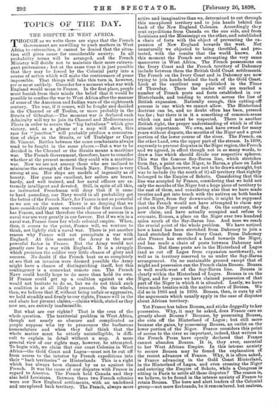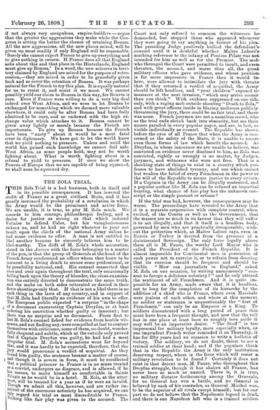TOPICS OF THE DAY.
THE DISPUTE IN WEST AFRICA. THOUGH as we write there are signs that the French Government are unwilling to push matters in West Africa to extremities, it cannot be denied that the situa- tion still gives cause for considerable anxiety. In all probability terms will be arranged, and the French Ministry will decide not to maintain their more extrava- gant pretensions ; but at the same time it is just possible that they may be forced by the Colonial party into a course of action which will make the continuance of peace impossible. That things will take this turn is, however, per se most unlikely. Consider for a moment what war with England would mean to France. In the first place, people must banish from their minds the belief that it would be possible to confine the war to West Africa after the manner of some of the American and Indian wars of the eighteenth century. The war, if it comes, will be fought and decided in the Channel or off Toulon, or more probably in the Straits of Gibraltar.—The moment war is declared each Admiralty will try to join its Channel and Mediterranean Fleets in order to secure the " big battalions " which give victory, and, as a glance at a map will show, this race for " junction" will probably produce a concentra- tion of ships in the Straits, or jiff Trafalgar or Cape St. Vincent. Battles between the same combatants always tend to be fought in the same places.—But a war to be decided in the Channel or the Straits means a maritime war. The French Government, therefore, have to consider whether at the present moment they could win a maritime war. Now we are not among those who are inclined to minimise the strength of the French Navy. France is very strong at sea. Her ships are models of ingenuity as of beauty. Her guns are excellent, her sailors are brave, hardy, and well trained, and her naval officers are ex- tremely intelligent and devoted. Still, in spite of all this, no instructed Frenchman will deny that if it came to hard pounding, our Navy would in all probability get the better of the French Navy, for France is not so powerful as we are on the water. There is no denying that we have considerably more war-vessels of the first class than has France, and 'that therefore the chances of success in a naval war are very greatly in our favour. But if we win in a naval war, France loses her whole colonial empire. When, then, it comes to the point, France will, we venture to think, not lightly risk a naval war. There is yet another reason why France will not precipitate a war with England. At this moment the Army is the most powerful factor in France. But the Army would not greatly care for a war with England. It is a struggle which promises the soldier very little chance of glory and success. No doubt if the French beat us so completely at sea that an invasion were deemed possible the Army might have a chance of distinguishing itself, but this contingency is a somewhat remote one. The French Navy could hardly hope to do more than hold its own. If France could get up a coalition against us she would not hesitate to do so, but we do not think such a coalition is at all likely at present. On the whole, then, we believe that if, without being unfair or aggressive, we hold steadily and firmly to our rights, France will in the end abate her present claims,—claims which, stated as they now are, are entirely inadmissible.
But what are our rights ? That is the crux of the whole question. The territorial problem in West Africa, though not nearly so obscure and complicated as people suppose who try to pronounce the barbarous nomenclature and when they fail think that the whole matter must be utterly unintelligible, is diffi- cult to explain in detail without a map. A more general view of our rights may, however, be attempted. To begin with, we claim that our coast Colonies in West Africa—the Gold Coast and Lagos—must not be cut off from access to the interior by French expeditions into their " back territories " or Hinterlands. This is a right which has always been claimed by us as against the French. It was the cause of our disputes with France in regard to America. The French held Canada and they also held Louisiana. Between these two French colonies were our New England settlements, with an undefined and unexplored back territory. The French, always more active and imaginative than we, determined to cut through this unexplored territory and to join hands behind the back of the New England Colonies. Accordingly they sent expeditions from Canada on the one side, and from Louisiana and the Mississippi on the other, and established a chain of forts with the object of preventing the ex- pansion of New England towards the west. Not unnaturally we objected to being throttled, and pro- tested, with the results that the world knows. At this moment the French are attempting the very same manoeuvre in West Africa. The French possessions on the Ivory Coast and the French territory of Dahomey include between them the British Gold Coast settlements. The French on the Ivory Coast and in Dahomey are now trying to join hands behind the back of the Gold Coast. Look at the excellent map published in the Times of Thursday. There the reader will see marked a number of French posts and forts established in our Hinterlands, and tending to stretch across the line of British expansion. Naturally enough, this cutting-off process is one which we cannot allow. The Hinterland doctrine can be, and no doubt often has been, pressed too far ; but there is in it a something of common-sense which can and must be respected. There is another British right, the proper understanding of which is of the utmost importance. We own, and have owned for many years without dispute, the mouths of the Niger and a great portion of the lower course of the river. The French, on the other hand, own the upper part of the stream. In 1890, expressly to prevent disputes in the Niger region, the French and we agreed, in effect though not in so many words, to draw a line which should divide our respective spheres. This was the famous Say-Barua line, which stretches from Say, a point on the Niger, to Barua, a place on Lake Chad. The line, however, was not to be drawn straight, but was to include (to the south of it) all territory that rightly belonged to the Empire of Sokoto. Considering that this line was accepted by France, considering that we hold not only the mouths of the Niger but a huge piece of territory to the east of them, and considering also that we have made treaties and got into touch with the natives on both banks of the Niger, from Say downwards, it might be supposed that the French would not have attempted to claim any point on the Niger south of Say. On the contrary, they now claim, and have actually occupied and refuse to evacuate, Boussa, a place on the Niger over two hundred miles south of the Say-Barua line. And here we reach the crucial point of the whole problem. We have noticed how a hand has been stretched from Dahomey to join a hand stretched from the Ivory Coast. From Dahomey also France has stretched a hand towards the Niger, and has made a chain of posts between Dahomey and Boussa. But these posts are in the Hinterland of Lagos (and so cut off Lagos from expansion northward), as well as in territory reserved to us under the Say-Barua arrangement. On no sustainable ground except that of might and possession can the French claim Boussa. Boussa is well south-west of the Say-Barua line. Boussa is clearly within the Hinterland of Lagos. Boussa is on the Niger, and for years we have claimed possession of that part of the Niger in which it is situated. Lastly, we have twice made treaties with the native rulers of Boussa. We did so in 1885 and in 1890. Boussa, then, is ours by all the arguments which usually apply in the case of disputes about African territory.
Yet France has taken Boussa, and sticks doggedly to her possession. Why, it may be asked, does France care so greatly about Boussa ? Because, by possessing Boussa, she cuts off the Hinterland of Lagos ; but still more because she gains, by possessing Boussa, an outlet on the lower portion of the Niger. France considers this point of access to the river so important, indeed, that writers in the French Press have openly declared that France cannot abandon Boussa. It is, they aver, essential to her West African Empire. In this intense anxiety to secure Boussa may be found the explanation of the recent advances of France. Why, it is often asked, is France advancing in the Gold Coast Hinterland, in the Hinterland of Lagos, and even crossing the Niger and entering the Empire of Sokoto, while a Congress is i sitting in Paris to settle all these disputes ? The reason is, we believe, to be found in the intense anxiety of France to retain Boussa. The keen and alert leaders of the Colonial group—not mere firebrands, be it remembered, but zealous, if not always very scrupulous, empire-builders — argue that the greater the aggressions they make while the Con- gress is sitting the better the chance of retaining Boussa. All the new aggressions, all the new places seized, will be given up most readily if only England will be reasonable. ' Surely she cannot expect France to give up everything and to give nothing in return. If France does all that England asks about this and that place in the Hinterlands, England must give up Boussa.' In a word, the new seizures in terri- tory claimed by England are seized for the purpose of retro- cession,—they are seized in order to be gracefully given back and so cover the retention of Boussa. It was perhaps natural for the French to try this plan. It is equally natural for us to resist it, and resist it we must. We cannot possibly yield our claim to Boussa in this way, for Boussa is ours. Even if France were willing to do a very big deal indeed over West Africa, and we were to let Boussa be exchanged for something which we deemed more valuable elsewhere, it could only be after Boussa had been fully admitted to be ours, and so endowed with the high ex- change value which attaches to it. Boussa cannot be given away lightly or merely because the French are importunate. To give up Boussa because the French have been " nasty " about it would be a most fatal error in diplomacy. We have got to let the world know that we yield nothing to pressure. -Unless and until the world has gained such knowledge we cannot feel safe. West Africa, as some people hold, may not be worth fighting about. What is worth fighting about is a refusal to yield to pressure. If once we show the Powers of Europe that we are capable of being squeezed, we shall soon be squeezed dry.







































 Previous page
Previous page